Niijima Distillery: 100 Years of Island Liquor
Oct 17,2024
Niijima Distillery: 100 Years of Island Liquor
Oct 17,2024
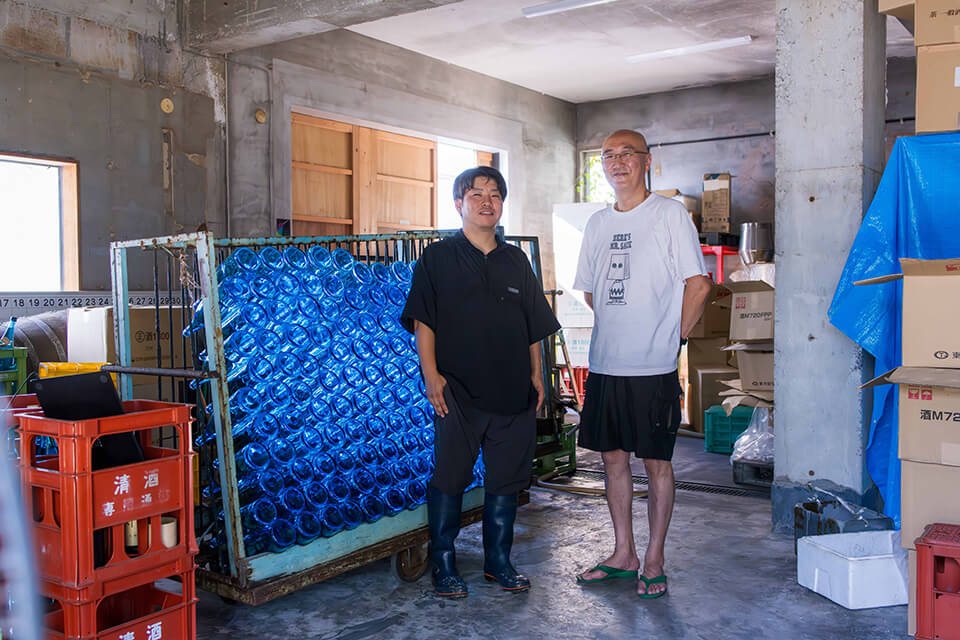

Niijima Distillery, which will celebrate its 100th anniversary in 2026, is the only distillery on Niijima making “island” liquor. Miyahara Jun, the fourth-generation owner of the distillery, and Sakurai Koji, an islander who returned to the island after living on the mainland, have worked in tandem to try fresh ideas for the business. The two men continue to produce shochu distilled alcohol spirits loved by local residents with the aim of crafting products that incorporate new elements while preserving the island’s traditions. For this article, we visited Niijima Distillery and spoke to the pair about their thoughts as they prepare to write a new page in the distillery’s 100-year history.
Since its founding in 1926, Niijima Distillery has carved out a history of almost 100 years as Niijima’s only distillery. The family business has been passed down through the generations, and in 2001, Miyahara Jun became the fourth-generation owner.
“My father became very ill when I was in high school, which left my grandfather and my mother to produce our shochu. That’s one of the reasons why I immediately returned to the island after graduating from university. For a time, it was just the two of us — my mother and me — running the shochu distillery, but she got injured and retired. After that, for over 10 years, I continued to make shochu on my own until Sakurai came.”
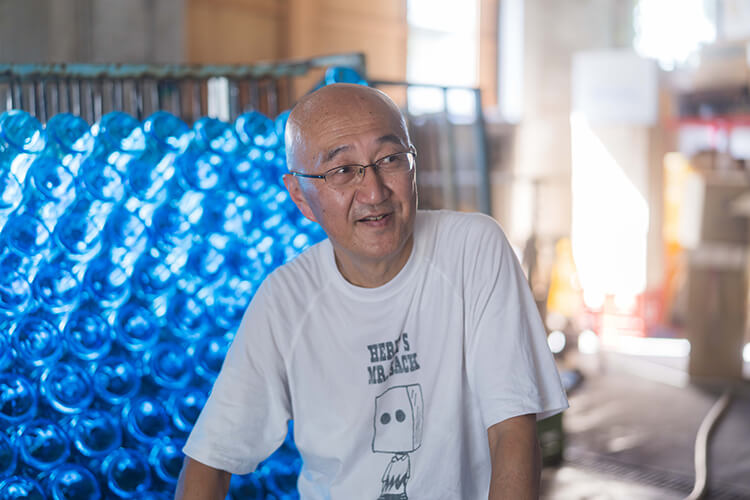
Miyahara Jun, Niijima Distillery’s fourth generation owner
Today, all the alcohol made on the island is produced by Miyahara Jun and Sakurai Koji, who returned to Niijima in 2016 after living on the mainland.
When Sakurai, who had been working in Tokyo, returned to Niijima, he was introduced to Niijima Distillery and began working there. However, he had absolutely no knowledge of distilling.
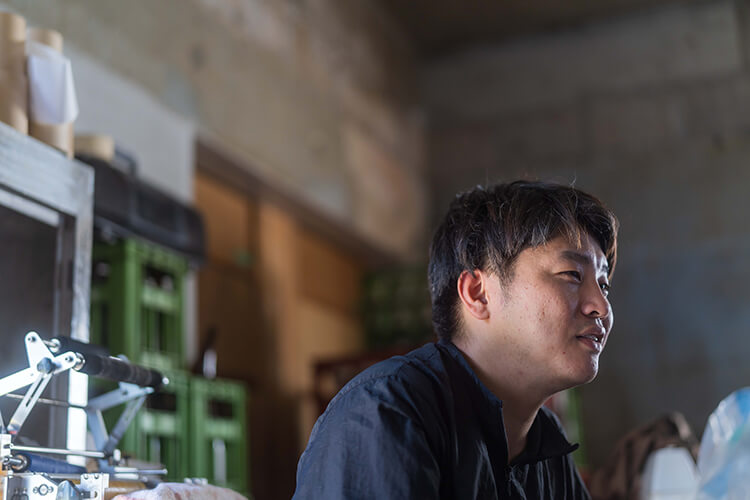
Sakurai Koji quit his restaurant job in Tokyo that he had gotten after graduating from university and returned to his birthplace in Niijima
“I had zero knowledge about distilling or making shochu, but liked to drink. Everyone on the island likes to drink,” says Sakurai.
His encounter with Niijima Distillery traces back to his high school days.
The senior students at Sakurai’s high school, the Tokyo Metropolitan Niijima High School, work on a project growing amerika-imo, a variety of sweet potato. The potatoes that the students take great care in raising are taken to Niijima Distillery, which uses the potatoes as the base ingredient for a special-batch shochu. This shochu, called Shichifuku Shimajiman, is then given to the students at their coming-of-age ceremony, two years after they graduate.
“I still clearly remember when I received my bottle of Shichifuku Shimajiman at my coming-of-age ceremony. It was so sweet and easy to drink, that I chugged it all in one go. It was a very special memory because it was made from the potatoes we had grown. I feel it’s an odd quirk of fate that I’m now involved in the production of that same shochu.”
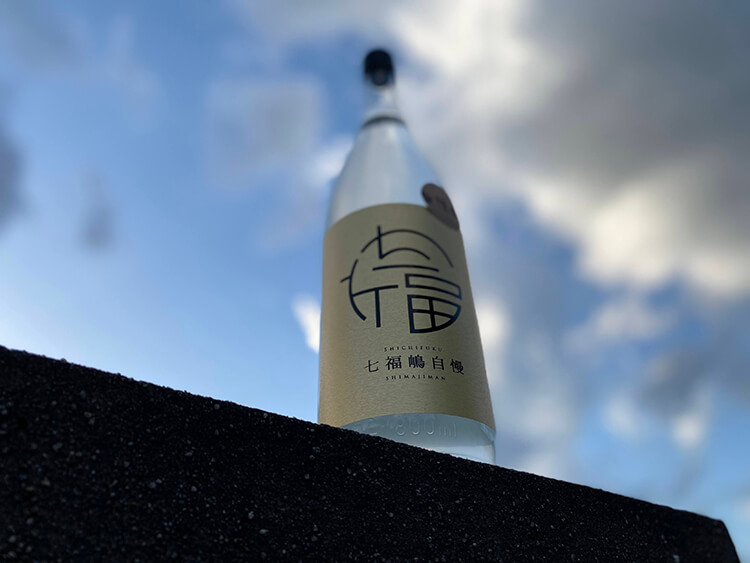
Shichifuku Shimajiman, with its gold label, is a fitting celebratory drink
The shochu’s name Shichifuku, which means seven good fortunes, is an auspicious name taken from shichifuku-imo, the official name of the sweet potato that the people of Niijima call amerika-imo.
The amerika-imo sweet potato is now a Niijima specialty, but its production dwindled from the mid-1960s onward, and by around 1985 imo-jochu, shochu distilled from sweet potatoes, itself had disappeared. Miyahara, however, wanted to revive the island’s tradition of imo-jochu and restarted its production in 2003.
“When I took over the company, our main product was barley shochu, and I had no idea how to make imo-jochu. I was helped out by distillers on the other Izu islands who produce imo-jochu. At the time, almost no one was growing the sweet potatoes that are base ingredient of imo-jochu. But with the cooperation of many growers, we were finally able to make it happen.”
What distinguishes Shichifuku Shimajiman and other shochu varieties produced on Niijima is that barley koji malt is used even in imo-jochu. Niijima Distillery’s leading product, Shimajiman, is a barley shochu made from domestic barley that uses white koji and vacuum distillation to produce the raw spirits, which are then stored and aged. Shimajiman is characterized by its light, toasty barley aroma, subtle sweetness, and satisfying taste.
Miyahara explains: “Our aim is to produce a beverage that people can drink every day without getting tired of it. That is, a shochu with a light aroma and no odd tastes. We use a vacuum distillation process because it leaves only a light aroma. What’s critical in making a shochu that’s easy to drink is not just the percentage of alcohol or the taste, but also the aroma. We are very conscious of cutting out as much of the heavy-feeling aroma as we can. That’s why our shochu pairs well with food, especially island dishes like kusaya fermented and dried fish, shimazushi — ‘island’ sushi that uses locally caught seasonal fish marinated in soy sauce, and tempura made with ashitaba herbs.”
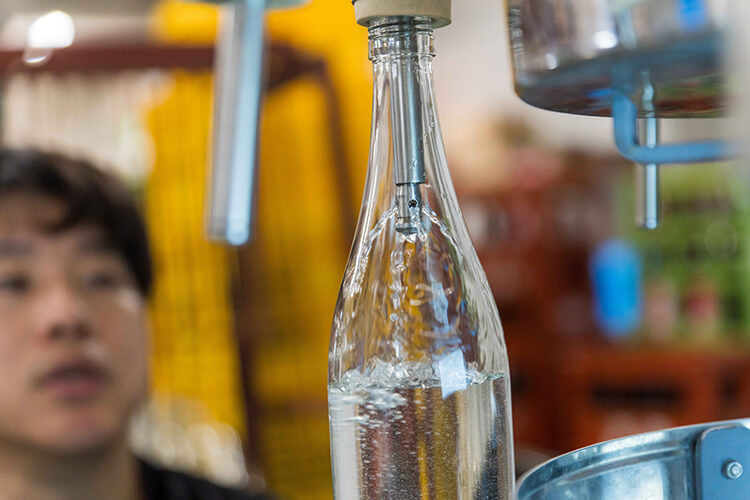
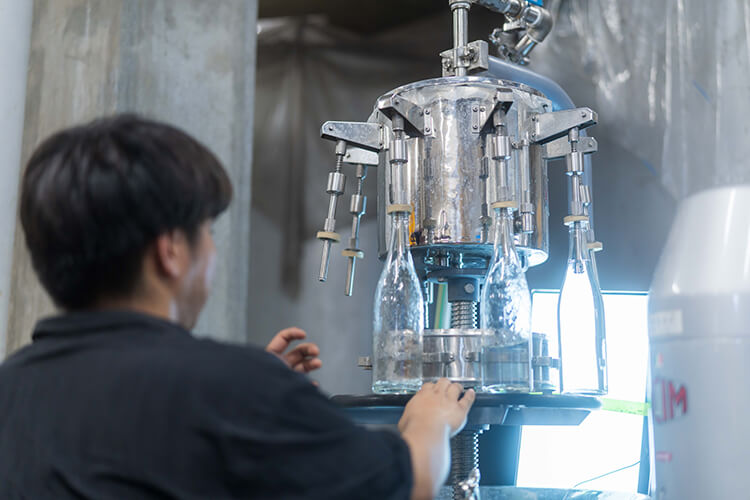
Sakurai carefully fills each bottle with shochu before shipping. A soft, sweet aroma fills the air.
In 2024, a geographical indication (GI) was set up for Tokyo Shimazake — shochu from Tokyo’s islands — that includes Niijima’s shochu. A GI is a system for identifying and protecting products originating in a specific region or locality and that have characteristics attributable to their geographical origin. The objective is to highlight the name of the region to guarantee the quality and dependability of the products and to increase their market value. The Tokyo Shimazake GI applies to shochu characterized by the use of barley koji and produced in Tokyo’s island towns of Oshima, Toshima, Niijima, Kozushima, Miyake, Shikinejima, Hachijo, and Aogashima.
In a previous article,“Salami and Pork Garum Made by Fermenting Pork with Barley Koji is Perfect as a Special Gift”, we introduced the world’s first salami made by fermenting pork with shochu koji that was developed by Yoshioka Manabu at Kreutzer, a meat specialty shop in Machida, Tokyo. The fermented shochu koji salami relies on the barley koji used to make Shimajiman.
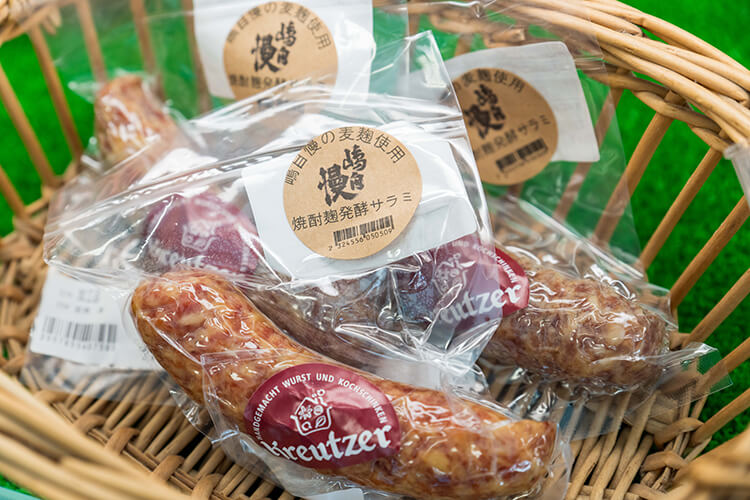
The fermented shochu koji salami contains chili peppers grown on Niijima, in addition to using Shimajiman’s barley koji, and has become a very popular Niijima souvenir
Yoshioka and Miyahara were university classmates who studied fermentation and brewing at the Tokyo University of Agriculture’s Department of Fermentation (now the Faculty of Applied Biosciences’ Department of Fermentation Science).
“I remember the first time I met him, he was wearing a curry-colored jean jacket. And I was wearing my high school’s baseball jacket. We got along right away, admiring each other’s jackets and deciding to swap them. We didn’t really keep in touch after graduation, but we met again just by chance at a department store’s food exhibition. He told me he wanted to make fermented and aged salami using koji, specifically the barley koji we use to make shochu. This conversation led to this product. Naturally, this salami goes perfectly with Shimajiman.”
“Recently, we’ve begun growing potatoes for our shochu. So we are doing farm work now too. We harvested almost 2,000 potatoes this summer. The two of us drove a tractor and laid down mulch sheets. We got into farming because of the COVID-19 pandemic, which left us with nothing to do. It’s more of a hobby than a job. The two of us started by wielding chainsaws and clearing a plot of farmland that had gone out of production.”
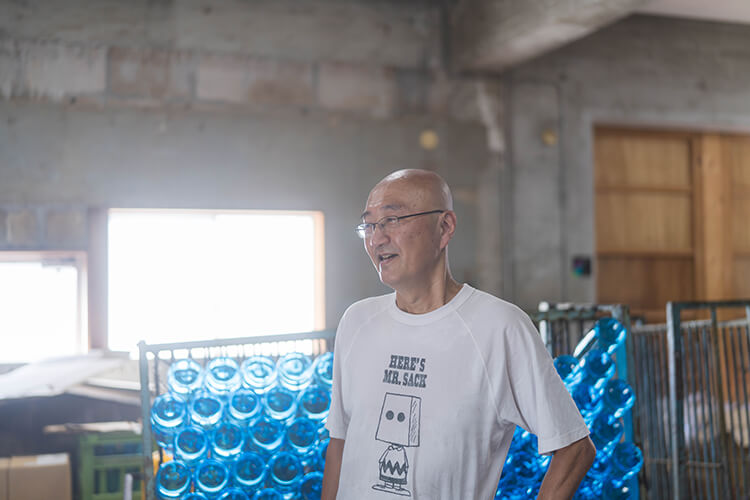
“I keep telling myself I should take a day off from drinking, but I always find myself having some shochu every day,” says Miyahara. Recently, he prefers mixing his shochu with refreshing soda.
The first year’s potato crop went well, with a successful harvest. Feeling confident that they could grow their own shochu potatoes, they got more serious about farming in their second year. Unfortunately, the weather did not cooperate and their harvest didn’t go as planned.
“We presume that a lack of rainfall was the cause. It’s difficult when you’re dealing with nature. Despite this setback, we want to grow potatoes each year because of the joy of the harvest. It’s a lot of labor, washing off the potatoes that we harvest and removing the roots. But it’s satisfying to be personally involved in the process from the very beginning.”
“If you overextend yourself, things can get chaotic,” Miyahara and Sakurai say with a laugh. Still, they have dreams to further expand Niijima shochu.
Niijima Distillery is carrying on 100 years of history while taking on new challenges. Undoubtedly, that passion is fueled by a pride in Niijima and a deep love for shochu.
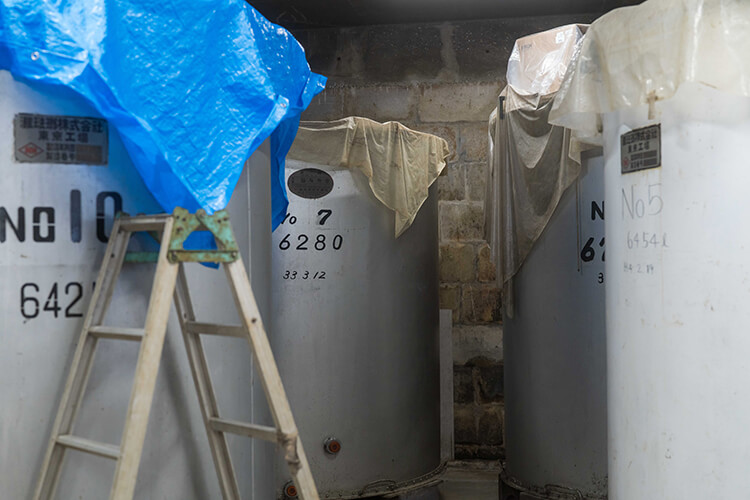
Hours pass by in silence at the distillery once the shochu is distilled
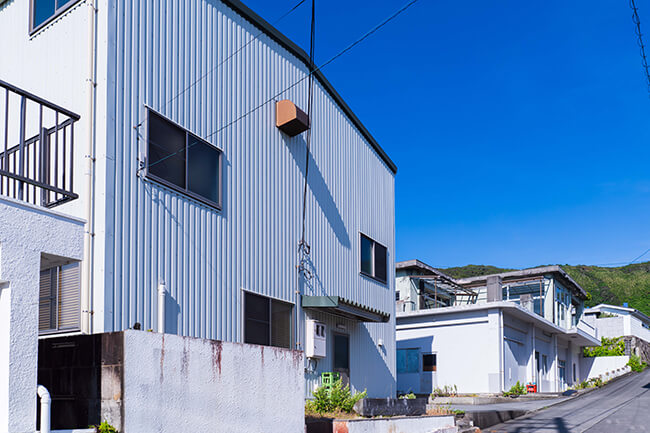
Getting to Niijima takes two hours and 20 minutes by high-speed jet ferry or eight and a half hours by overnight ferry from Tokyo’s Takeshiba Sanbashi Pier. There are also ferry services from Kurihama Port in Kanagawa and Shimoda Port in Shizuoka.
Contact Tokai Kisen at 03-5472-9999 or 0570-005710
URL:https://www.tokaikisen.co.jp/en/